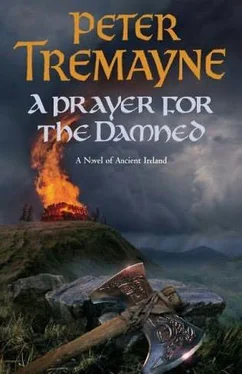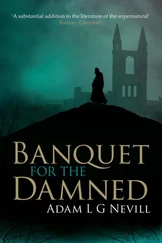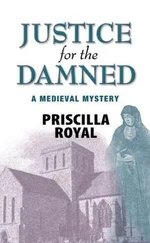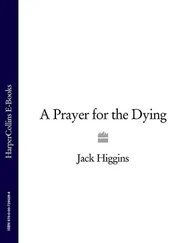Peter Tremayne - A Prayer for the Damned
Здесь есть возможность читать онлайн «Peter Tremayne - A Prayer for the Damned» весь текст электронной книги совершенно бесплатно (целиком полную версию без сокращений). В некоторых случаях можно слушать аудио, скачать через торрент в формате fb2 и присутствует краткое содержание. Жанр: Исторический детектив, на английском языке. Описание произведения, (предисловие) а так же отзывы посетителей доступны на портале библиотеки ЛибКат.
- Название:A Prayer for the Damned
- Автор:
- Жанр:
- Год:неизвестен
- ISBN:нет данных
- Рейтинг книги:4 / 5. Голосов: 1
-
Избранное:Добавить в избранное
- Отзывы:
-
Ваша оценка:
- 80
- 1
- 2
- 3
- 4
- 5
A Prayer for the Damned: краткое содержание, описание и аннотация
Предлагаем к чтению аннотацию, описание, краткое содержание или предисловие (зависит от того, что написал сам автор книги «A Prayer for the Damned»). Если вы не нашли необходимую информацию о книге — напишите в комментариях, мы постараемся отыскать её.
A Prayer for the Damned — читать онлайн бесплатно полную книгу (весь текст) целиком
Ниже представлен текст книги, разбитый по страницам. Система сохранения места последней прочитанной страницы, позволяет с удобством читать онлайн бесплатно книгу «A Prayer for the Damned», без необходимости каждый раз заново искать на чём Вы остановились. Поставьте закладку, и сможете в любой момент перейти на страницу, на которой закончили чтение.
Интервал:
Закладка:
‘You’d best explain.’
‘Cathal and his brehon went to a small chapel within sight of the walls of Cill Ria. The notices were given and the fast began. You will correct me on the law, Fidelma, but I have been told that if the plaintiff, that is Cathal, persists in his fast even though the defendant, Ultán, has offered to settle the case, the case automatically lapses. The defendant is exonerated and no further action can be taken.’
Fidelma looked thoughtful. “This is true. But are you saying that Ultán offered to settle the matter and this was refused by Cathal who continued the ritual fast?’
Abbot Augaire leaned forward. ‘What I am saying is that was how it was represented.’
‘But the witnesses? There have to been witnesses to the offer and its refusal?’
Abbot Augaire shrugged. ‘Oh yes. The brehon of Ulaidh had been invited to Cill Ria. Ultán said he would pay compensation as a token of goodwill to Muirchertach and his wife even though he still felt he was not responsible. The brehon of Ulaidh agreed that this was a noble thing. So the offer was inscribed on hazel wands and given to Brother Drón to take to the chapel where Cathal was fasting. What happened then is a matter of argument.’
‘What happened according to Cathal and his brehon?’
‘Cathal said that Drón had not come to the chapel. Three days later, as was the required time, the brehon of Ulaidh and Brother Drđn came to the chapel and found Cathal still engaged in his troscud and denounced him, claiming that he had refused to give up his ritual fast even when compensation was offered. Therefore, according to law, he no longer had a claim.
‘Cathal protested that no one had come to him with this offer. Then Brother Drón came forward and swore that he had done so. He said that he had found Cathal alone, and pressed the offer into his hands.’
‘What did Cathal’s brehon say?’ queried Fidelma. ‘As witness, he could not leave the one engaged in the troscud alone so he must have seen what happened.’
‘Under fierce questioning from Brother Drón it was discovered that at dusk on the day Drón claimed to have delivered the offer, the brehon had been persuaded to go to the aid of a girl who had come tearfully to the chapel pleading for help with a sick mother who had collapsed. There was, of course, no sick mother and the girl had disappeared. I suspect it was one of the females at Cill Ria.’
‘That in itself could have been legally challenged as an enticement to pervert the law.’
‘True, but the brehon of Ulaidh — again it seems prompted by Drón — caused the chapel to be searched. .’
‘And the hazel wands were found in Cathal’s belongings?’ guessed Fidelma.
‘Just so.’
Eadulf, who had been quiet for some time, snorted. ‘It is possible that Brother Drón came that day, waited until Cathal’s witness was lured elsewhere, then placed the hazel wands in the chapel and disappeared back to his master with this tale of having delivered the notice. But how can one prove it?’
Abbot Augaire nodded. ‘That is how I would see it. Moreover, I am sure that it was at the specific behest of Ultán, who was not going to pay compensation in any form.’
‘And Cathal? Did he challenge this?’
‘There was no evidence against Drón or Ultán. The girl could not be found. Ultán magnanimously’ — he sneered the word — ‘suggested that Cathal be allowed to return to Connacht and no more need be said. Cathal came back, a broken young man.’
‘So no one has prospered?’
‘Except Ultán.’
‘I do not think he prospered much last night.’
Abbot Augaire shrugged. ‘It was not before time that his sins caught up with him.’
‘Even so. .’ protested Eadulf. ‘An abbot has been murdered.’
‘You condemn me for not following the teaching of our Faith and forgiving and loving Ultán?’ the abbot asked in amusement.
‘It is not my place to condemn you,’ replied Eadulf, ‘but isn’t it the cornerstone of our Faith to love one’s enemies?. . diligite inimicos vestros benefacite his qui vos oderunt . .’
‘I am well acquainted with the words of Luke,’ snapped Abbot Augaire.
‘Reporting the instructions of Christ,’ Eadulf reminded him.
‘Sometimes I am led to wonder whether his words were reported and translated correctly.’
Fidelma raised an eyebrow slightly. ‘You doubt it?’
‘When men like Ultán rise up and we are told we must all respect and obey him, then I believe we should rebel at such a teaching. When we are oppressed, it is our duty to deal with the oppressor. Was that not the faith of our forefathers?’
‘That was before the Word reached us and told us to tread a different path.’
‘Beati pauperes spiritu quoniam ipsorum est regnum caelorum,’ Abbot Augaire quoted, unconsciously echoing Eadulf. Blessed are the poor in spirit, for theirs is the kingdom of heaven.
‘It sounds as if you do not believe in those words,’ Fidelma pointed out.
‘I am no longer young and idealistic,’ replied Abbot Augaire. ‘I have seen man’s evil nature. Why should poverty of spirit be the great virtue of the Faith? Indeed, I doubt it is a virtue at all. I believe poverty of spirit is a crime.’
Eadulf exhaled deeply. This was an argument against all that he had been taught of the Faith.
Fidelma was considering the abbot thoughtfully. ‘A crime? Perhaps you will explain that reasoning.’
‘When people are poor in spirit, do not the proud and haughty in spirit emerge to dominate them and oppress them? If you do not resist evil, if you do not resist wrong, then you encourage further evil and injury at the hands of those who have the other cheek turned to them. Ego autem dico vobis non resistere malo sed so quis te percusserit in dextera maxilla tua praebe illi et alterant . As Matthew reports the words of Christ — “I say to you, resist not evil and who strikes you on the right cheek, offer him the other.” But to do what? To strike you a second time? Better, should he strike you on the right cheek, that you firmly prevent him from being able to inflict that hurt a second time.’
Fidelma was quiet for a moment and then she sighed. ‘Perhaps you are right in what you are saying, Abbot Augaire. I remember the words of my mentor, the Brehon Morann. He would often point out an ancient saying: “He who encourages the oppressor shares the crime.” I can understand your fear that poverty of spirit can lead people into bondage. But the New Faith makes demands and we must do the best we can.’
Abbot Augaire smiled wanly. ‘You are a logical person, Fidelma. I have heard of your reputation. You understand the arguments and are not afraid to engage in them. I rushed to the Faith because of my emotions and now my emotions have become numb and logic has taken over. As an abbot and bishop, I find myself plagued with guilt. But I shall not add to my guilt by pretending that I can love and forgive someone who is evil.’
Fidelma nodded slowly.
‘We thank you for your time, Abbot Augaire,’ she said, rising as if she would end the discussion.
Abbot Augaire rose with them but he seemed preoccupied for a moment. ‘Can it be that Muirchertach may well be guilty of this deed?’
‘Do you doubt his innocence?’ Fidelma demanded. ‘I thought that you did not want to say a word against him lest it harm his defence.’
Abbot Augaire considered for a moment and then shook his head slowly.
‘I would not like to see Muirchertach or anyone blamed for ridding us of a man like Ultán,’ he said. ‘If you would know more of Ultán, speak to Fergus Fanat, a warrior prince of the Uí Néill, who is with the entourage of Blathmac, the king of Ulaidh. As for Muirchertach, he is a man who has secrets. I have observed that there is little love between his wife and himself. So I wonder why he should go to such extremes to seek compensation for the death of his wife’s sister?’
Читать дальшеИнтервал:
Закладка:
Похожие книги на «A Prayer for the Damned»
Представляем Вашему вниманию похожие книги на «A Prayer for the Damned» списком для выбора. Мы отобрали схожую по названию и смыслу литературу в надежде предоставить читателям больше вариантов отыскать новые, интересные, ещё непрочитанные произведения.
Обсуждение, отзывы о книге «A Prayer for the Damned» и просто собственные мнения читателей. Оставьте ваши комментарии, напишите, что Вы думаете о произведении, его смысле или главных героях. Укажите что конкретно понравилось, а что нет, и почему Вы так считаете.












